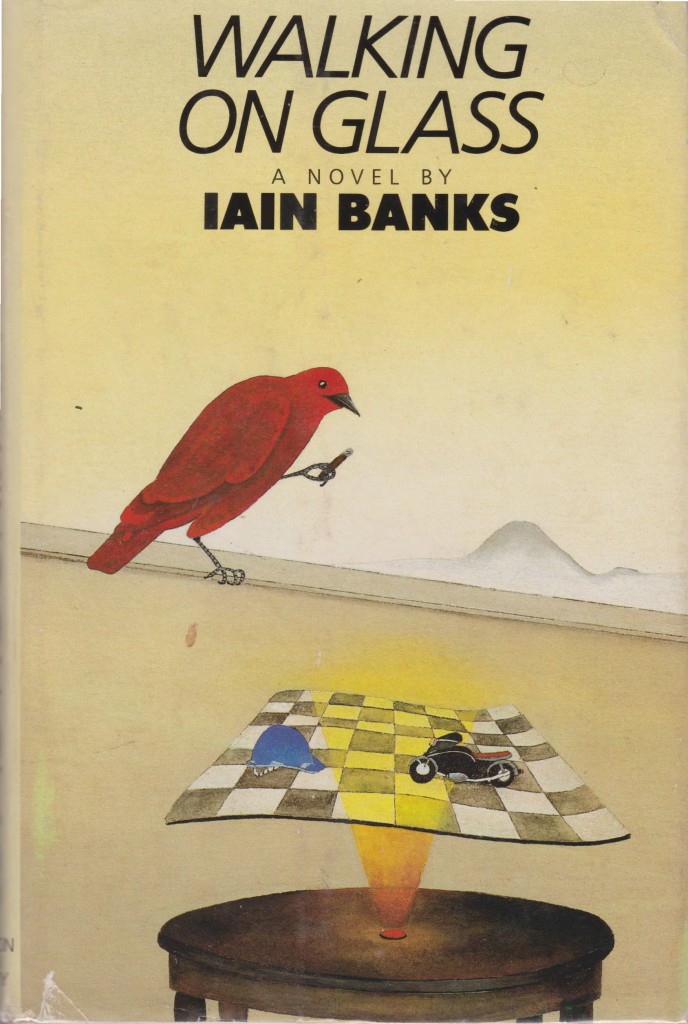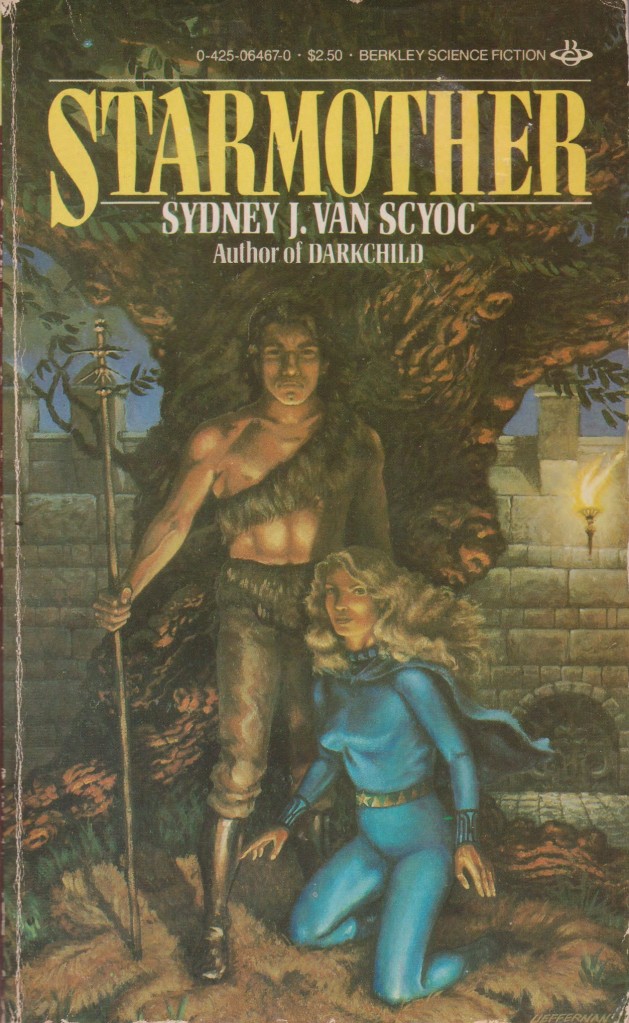Which books/covers/authors in the post intrigue you? Which have you read? Disliked? Enjoyed?
1. Santiago: A Myth of the Far Future, Mike Resnick (1986)

Michael Whelan’s cover for the 1st edition
From the back cover: “SEBASTIAN NIGHTINGALE CAIN: County hunter. You can call him Songbird–but only once. He’s after Santiago.
VIRTUE MECKENZIE: Freelance reporter. She never give up. She wants an interview… with Santiago.
THE SWAGMAN: He collects art–at gun point. He wants a few pieces currently in the hands of Santiago.
SANTIAGO: Bandit, murderer, known to all, seen by none… has he killed thousand men? He has saved a dozen worlds? His legend is as large as the Rim itself, his trail as elusive as a wisp of starlight in the empty realms of space. The reward for him is the largest in history.
SANTIAGO: Do you dare to chase him?”
Initial Thoughts: I have yet to read anything by Mike Resnick. I know this is outside of my self-imposed endpoint of 1985 by a year…. but…
2. Walking on Glass, Iain Banks (1985)

Petra Mathers’ cover for the 1986 edition
From the inside flap: “Graham Park, an art student, i on his way to meet the woman with whom he has been in love for months. She is an enigma to him. He is walking on air. He has innocence on his side.
Steve Grout trusts nobody, nothing. In the grip of a wholly justifiable paranoia, he knows that They are out to get him. He wears a safety helmet at all times as a precaution against invisible enemies. He does not know it, but the attack will come from the sky.
Quiss, an irritable old man protected against the cold of his shale castle by layers of fur capes, plays interminable, impossible games that are a prelude to a riddle. The answer to the riddle will release him. He is walking on glass.
These three men are on a collision course.
With the brilliance of language and penetrating understanding of human nature that inspired Andrew Greeley to call Iain Banks’ first novel The Wasp Factor, “one of the strangest stories of grace and redemption that it has ever been my privilege to read,” the author has produced a dazzling work of many dimensions. Walking on Glass is a story of the crime of innocence, the conspiracy of law, and the dark comedy of survival.”
Initial Thoughts: I’ve only read Banks’ The Wasp Factory (1984). One of multiple authors I wish I had discovered when I read SF more widely in my late teens and early 20s as I never got around to the Culture novels before I found my niche. Walking on Glass appears to contain some science fictional elements although it was not published under his full “Iain M. Banks” name that he used for his genre works.
3. Starmother, Sydney J. Van Scyoc (1976)

David Heffernan’s cover for the 1984 edition
From the cover: “Centuries have passed since the first Earth colonies were founded, evolution has played cruel tricks. The backplanet [sic] of Nelding is an especially tragic case. There, an eruption of grotesque mutations has divided the colony into two hostile races.
Peace Cadet Jahna came to Nelding to care for mutant infants, and soon found herself the center of a strange rite. Hailed as the bearer of healing life by some, vilified as a force of devastation by others, was she the long-awaited deity from the skies–the awesome and legendary STARMOTHER?”
Initial Thoughts: I recently covered Van Scyoc’s first three published SF short stories. I look forward returning to her novels.
4. Scavengers, David J. Skal (1980)

Gerry Daly’s cover for the 1st edition
From the back cover: “AT THE CHURCH OF THE EXTENDED MIND THE ULTIMATE SENSATION IS INHABITING THE MINDS OF OTHERS…
Now Tracy’s own mind was putty from their endless experiments. The injections she took kept her afloat… but on a sea of other people’s dreams and alien desires. Now she couldn’t live with them and she couldn’t live without them.
There Brian sought the remains of Kelly, his lover. He only wanted to bring her back, to salvage some piece of her for himself. He found the girl, Tracy, and made her a vehicle for his own experiment. And soon three minds grappled for life.. in a private hell only two could survive.”
Initial Thoughts: Skal passed away in January this year. I read his first-published short story “Chains” (1971) recently. It had potential.
For book reviews consult the INDEX
For cover art posts consult the INDEX
For TV and film reviews consult the INDEX
I just reread Kutter and Moore’s “Private Eye” for the first time in ages – and am thinking about picking up more of their works (I’ve read quite a few, but I’m sure there are some I’ve missed.
Nice. I’ll have a review of one of their collections up in the next week or so.
I thought for a second you were referring to a story in one of the books in this post vs. referencing something you acquired — super confused!
Oops. Sorry about the confusion!
No problem.
Have you read Moore’s last novel Doomsday Morning (1957)? It’s a shame she did not continue writing. https://sciencefictionruminations.com/2013/10/17/book-review-doomsday-morning-c-l-moore-1957/
Yes, it’s too bad her second husband seems to have talked her out of continuing her literary career.
I second that sentiment. While it’s been more than a decade since I read Doomsday Morning, it felt like a major shift in her style — and a good one at that.
Not yet. Did you see the story in Asimov’s a few years ago, about a time traveler going back to meet Moore (http://www.rocketstackrank.com/2017/02/Grandmaster-Jay-OConnell.html)?
On the subject of Banks – the only non-SF of his I’ve read so far is “The Business” (which reminded me of the very-near-future SF that Gibson does sometimes). I liked it a lot.
I did not. I read little to no newer SF of any kind. But, it sounds like a fun premise!
This one is described as having SFish elements — and part of it may or may not be in the far future.
Resnick was a Hugo favourite but I thought he was a terrible writer. A lot of popularity rested on his appropriation of some African cultures.
Banks’s early novels were trying a bitt too hard to be literary. But then he started churning out literate thrillers and space opera. I remember Walking on Glass being somewhat opaque. He wrote many better books.
I’m a fan of Van Scyoc’s sf, have been for years. I always felt she was extremely good at depicting alien societies. Starmother was one of her lighter works, IIRC. The Sunstone trilogy is probably her best work–not sure if it meets your criterion.
Re-Banks: I dunno. I thoroughly enjoyed The Wasp Factory (1984).
As for Scyoc, what I’ve read so far is solid. I’ve reviewed her first three published short stories and in the very first years of my site I read (and apparently, due to my youth and lack of context to what she was doing, misinterpreted) Assignment Nor’ Dyren (1973). I own a copy of Darkchild (1982)–the first in the Sunstone sequence–but I haven’t featured it yet in my acquisition posts.
Did you see my review of Brunner from yesterday? I know we talked about Squares it recently.
Van Scyoc was definitely one of the better female mid-lit sf writers of the 1980s. It’s a shame she wasn’t better-known. For some reason, I’m reminded of Julian May, who hit the big time in the early 1980s with her Pliocene trilogy. Van Scyoc was the better writer, and her Sunstone trilogy was from around the same time, but May had been attending cons for years, and her books were much fatter and easier reads.
I saw your review of The Squares of the City. It’s a been a while since I read it, but I always seem to come away from Brunner novels disappointed. I hear so many good things about his books, but Stand on Zanzibar was tedious and The Jagged Orbit was awful.
Yeah, we do not see eye-to-eye on a lot of SF. I knew that a decade ago. haha. It’s fine!
I love Brunner and Stand is far from tedious and my favorite SF novel.
Resnick was adept at glad-handing fans at cons, thus all the Hugo Award, but his fiction was wretched.
Ah, memories of the Spinrad essay in which he opined that while he wasn’t really sure if the world outside the Anglosphere had SF, at least Africa had Resnick to speak for them. You won’t find that essay on the Asimov’s site. It was quickly scrubbed.
So, you’re telling me this cover is then a representative look at his fiction? Haha!
I will need to read some to make a call but this cover… wow…
Oof. That is… something else.
Resnick also co-wrote The Red-Tape War with Jack L Chalker, which was so bad one of the original contributors pulled out.
His last Hugo-nominated story, about a robot discovering faith, could have been written in the 1950s.
Nostalgia strikes us all.
It’s not just the gladhanding of fans that Resnick did well — thought that is true — but a subset of that, perhaps. One on one (or two on one, as I experienced once with he and Eric Flint) he was a really wonderful storyteller.
Transmuted to actual fiction, it’s easier to see the slackness, the cliches, in the prose (which in conversation are either to be expected because who polishes their sentences in conversation?, or which are mediated by tone of voice, expression of face, all that.) And it’s easier to see the shortcuts, and the sentimentality and the coddling of the reader.
I was once astonished, really offended, that one of his stories (“The Elephants on Neptune”, I think) got a Hugo nomination. Naturally I fulminated in my Hugo nominations roundup (figuring that a guy like Resnick could handle it, mind you — which, I should say, he could) — but no one noticed or changed their habits of nominating him every year. 🙂
And, for all that, I have to say that our conversations at various cons — only a few — were a lot of fun. He was worth talking to. (It’s just, that doesn’t mean he was worth nominating for a Hugo.)
Santiago intrigues me and has for a while. I’ve read Walpgurnis III set in the same universe.
The Skal looks intriguing. I read and rather liked his Antibodies.
What did you think of Walpgurnis III? There seems to be some major dislike of his fiction in amongst the other commenters…
Skal just passed away as you probably know — you should take a stab at the Skal. You’ll probably get to it before me.
I liked Walpgurnis III as an adventure story though, as some reviewers have pointed out, its moral perspective seems rather wonky. I did post one of my Raw Feeds on it (which are, of course, not really reviews as much as my notes).
Please link it when you do. I am not always the best at quickly reading relevant posts.
Thank you.
Apparently I already read your post! I liked it back in 2023.
Here’s my look at Skal’s Antibodies though it’s a bit outside of your 1985 cutoff: http://marzaat.com/2016/10/16/breaking-the-skin/
I have read “Santiago” by Mike Resnick (in the Greek translation) and I really liked it a lot. It was very well written, intriguing and original.
I’m glad some older stuff is translated. Did you read anything else by him?
Unfortunately, no other novel of his has been translated in Greek. Perhaps some short stories, but I’m not sure.